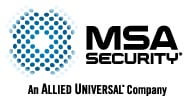Here at MSA we get many questions about our Windsor Canines. Most do not realize we work with German Shepherds as well as Labrador Retrievers. We sat down with our very own canine master, or Director of Canine Training (whatever you prefer to call him), Mike Wynn* and asked him some of our most frequent questions about Shepherds!
Question: Have you been working with Shepherds as long as the Labradors?
Just like the labs, we have been sourcing, training, and deploying German Shepherds as Explosive Detection Canines for over 30 years.
Question: Aren’t Shepherds too aggressive for this type of work?
In our 30 years in business, we have a pristine safety record. They are not aggressive 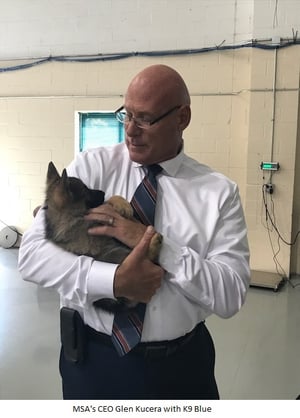 canines, and in fact, the selection and provision of well-adjusted and friendly German Shepherds is a core aspect of our mission. Our program is led by experts in the fields of veterinary science and canine training with decades of experience in this area.
canines, and in fact, the selection and provision of well-adjusted and friendly German Shepherds is a core aspect of our mission. Our program is led by experts in the fields of veterinary science and canine training with decades of experience in this area.
To ensure each canine meets our requirements for sociability, MSA partners with a number of well-qualified organizations, which raise service and working dogs. MSA’s experts have developed extensive relationships with the staff at our partnered organizations, thoroughly briefing them on our requirements for even-tempered, patient, driven, and friendly canines. Any canine with a history of aggressive behavior is removed from consideration for MSA. The organizations recommend canines for our program based on their knowledge of our requirements. Before acceptance, our master trainers and veterinarians thoroughly evaluate each and every canine based on their keen sense of smell, strong drive, intelligence, stable temperament and eagerness to please.
Question: Are they trained the same way as Labradors?
Training is very similar for Shepherds and Labradors. Before they even get to us for odor imprintation, both breeds go through approximately one year of socialization with a puppy raiser at one of our partnered organizations. During this period of time, they are actively exposed and acclimated to various people, places, smells, noises, and more. They are taken on public transportation, through mass gathering venues, to sports games, parks, and are encouraged to interact with many people. When canines are acclimated to a multitude of environments during this early period of their lives, they are conditioned to respond positively.
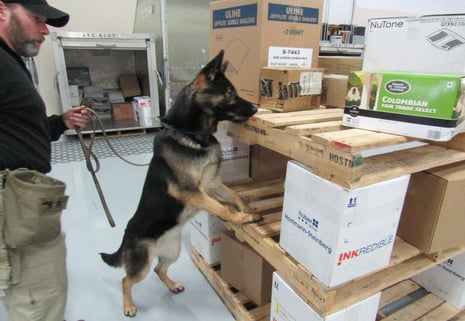
Once they are selected for Explosive Detection work by MSA, imprintation is conducted in the same way with the only distinction being the "reward" system. Shepherds are very high energy and respond best to a "play" reward. Thus, they get a ball when they make a positive indication, whereas labs, which are food driven, are rewarded with food.
Question: What is the process once the canine is selected and approved to be a “Windsor Canine”?
Once accepted by us, canines undergo additional training which reinforces their socialization habits and responses. The program begins with olfactory imprintation on 32 commercial and military explosive odors from all five families of explosives. As training progresses, canines are taught to passively respond to the presence of an explosive odor by sitting and looking at the trainer. Each canine completes numerous 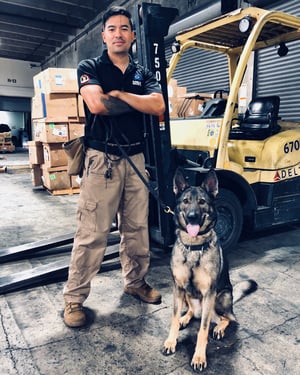 runs with a master trainer every day, in a variety of configurations, until the passive response is perfected.
runs with a master trainer every day, in a variety of configurations, until the passive response is perfected.
Throughout the training process, canines are taught to maintain a calm temperament during the search and response. At no point will the canine paw at or retrieve an explosive device or chemical once it has been located. Towards the completion of training, canines are paired with a handler with whom they will work and live with for the duration of their explosive detection careers. Their passive response remains consistent when the dog is turned over to the handler. MSA has found this single-handler methodology strengthens the working bond and enhances obedience and success in the field. Our success is validated through numerous industry and government certifications including the North American Police Work Dog Association (NAPWDA) validations, U.S. Department of Homeland Security SAFETY Act, U.S. Transportation Security Administration’s Third Party Canine Program, and more.
Have more questions about our program? Ask Mike here!
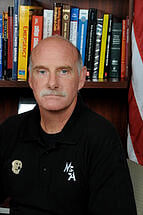 *MSA’s Director of Canine Training is Mike Wynn. Mr. Wynn is a retired Connecticut State Trooper who was a Master Trainer and lead instructor for the Connecticut State Police canine program. He has over 20 years of experience training police work dogs and is certified by the New England State Police Accreditation Committee. While working with the Connecticut State Police, he led a task force commissioned by the Department of State to create an EDC Anti-Terrorism Assistance Program to protect at-risk State Department locations worldwide. Mr. Wynn is certified as an expert witness in both State and Federal court on matters relating to police work dogs. He is one of the foremost authorities on police working dogs and has spoken on behalf of the Bureau of Alcohol, Tobacco, Firearms and Explosives (ATF) and the United States Police Canine Association on many occasions. He was recently appointed to the Department of Homeland Security’s advisory panel for the Explosives Standards Working Group. This panel is drafting a set of national standards for bomb dog training and operations. He is a member of the International Association of Bomb Technicians and Investigators.
*MSA’s Director of Canine Training is Mike Wynn. Mr. Wynn is a retired Connecticut State Trooper who was a Master Trainer and lead instructor for the Connecticut State Police canine program. He has over 20 years of experience training police work dogs and is certified by the New England State Police Accreditation Committee. While working with the Connecticut State Police, he led a task force commissioned by the Department of State to create an EDC Anti-Terrorism Assistance Program to protect at-risk State Department locations worldwide. Mr. Wynn is certified as an expert witness in both State and Federal court on matters relating to police work dogs. He is one of the foremost authorities on police working dogs and has spoken on behalf of the Bureau of Alcohol, Tobacco, Firearms and Explosives (ATF) and the United States Police Canine Association on many occasions. He was recently appointed to the Department of Homeland Security’s advisory panel for the Explosives Standards Working Group. This panel is drafting a set of national standards for bomb dog training and operations. He is a member of the International Association of Bomb Technicians and Investigators.
